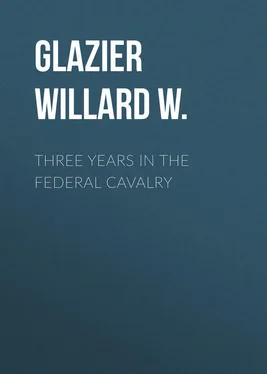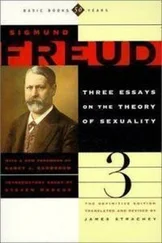Willard Glazier - Three Years in the Federal Cavalry
Здесь есть возможность читать онлайн «Willard Glazier - Three Years in the Federal Cavalry» — ознакомительный отрывок электронной книги совершенно бесплатно, а после прочтения отрывка купить полную версию. В некоторых случаях можно слушать аудио, скачать через торрент в формате fb2 и присутствует краткое содержание. Жанр: История, foreign_antique, foreign_prose, short_story, на английском языке. Описание произведения, (предисловие) а так же отзывы посетителей доступны на портале библиотеки ЛибКат.
- Название:Three Years in the Federal Cavalry
- Автор:
- Жанр:
- Год:неизвестен
- ISBN:нет данных
- Рейтинг книги:4 / 5. Голосов: 1
-
Избранное:Добавить в избранное
- Отзывы:
-
Ваша оценка:
- 80
- 1
- 2
- 3
- 4
- 5
Three Years in the Federal Cavalry: краткое содержание, описание и аннотация
Предлагаем к чтению аннотацию, описание, краткое содержание или предисловие (зависит от того, что написал сам автор книги «Three Years in the Federal Cavalry»). Если вы не нашли необходимую информацию о книге — напишите в комментариях, мы постараемся отыскать её.
Three Years in the Federal Cavalry — читать онлайн ознакомительный отрывок
Ниже представлен текст книги, разбитый по страницам. Система сохранения места последней прочитанной страницы, позволяет с удобством читать онлайн бесплатно книгу «Three Years in the Federal Cavalry», без необходимости каждый раз заново искать на чём Вы остановились. Поставьте закладку, и сможете в любой момент перейти на страницу, на которой закончили чтение.
Интервал:
Закладка:
The boys will not soon forget the long, dreary, dangerous hours they spent along this line. Here we find ourselves shivering around a miserable fire among the sighing pines (though in times of special danger we are not permitted to have even this slight comfort, for fear of detection), often compelled to sit or lie down in snow or mud, or to walk about smartly to prevent freezing to death. Sometimes, when much exhausted, we have laid ourselves down on the damp and muddy ground, which was frozen stiffly all around us when we awoke. Frozen fingers and toes are no uncommon things.
In this wretched plight we hear the summons to get ready to stand post. We go out upon our shivering horses, to sit in the saddle for two hours or more, facing the biting wind, and peering through the storm of sleet, snow, or rain, which unmercifully pelts us in its fury. But it were well for us if this was our worst enemy, and we consider ourselves happy if the guerilla does not creep through bushes impenetrable to the sight, to inflict his mortal blows. The two hours expire, relief comes, and the vedette returns to spend his four, six, or eight hours off post, as best he may.
Once, at least, during the night, we are visited by the grand guard, which consists of the officer of the day, accompanied by others, whose duty it is to make a thorough, though usually swift, inspection of the picket line. Most of our time is spent in this duty.
March 29. – Considerable excitement prevailed among us to-day, as Colonel Bayard was dispatched with a detachment of his regiment to repulse a dastardly raid made by some of General J. E. B. Stuart's men, on the house of a Mrs. Tenant, a Union lady, residing near Difficult Run, about six miles from Chain Bridge. Colonel Bayard reached the place a few moments too late, and the raiders succeeded in taking Mrs. Tenant as a prisoner, and making off with their prey.
For several weeks the main portion of our grand army has been sent by transports to the Peninsula, with the evident intention of moving upon Richmond by shorter land routes than by way of Manassas. This change in our plans of attack was probably known by the Rebels before they were matured at Washington, and we now understand why they so quietly evacuated their positions on our front.
General McDowell remains in command of the defences of Washington, with a force sufficient, it is believed, to give safety to the Capital, and to harass the Rebels who continue before us. With the departure of General McClellan to the Peninsula, our picket lines were withdrawn to Annandale and Falls Church, within a few miles of the fortifications of Washington.
April 4. – The Harris Light and the First Pennsylvania Cavalry were recalled from the picket lines and sent out on a reconnoissance in force, with a division in command of General McDowell. Our march led us through Fairfax Court House and Centreville, near which we bivouacked for the night.
Already, at this early spring time, a luxurious vegetable growth of green is beautifully carpeting the fields through which we pass and in which we halt. Flowers of great beauty and variety of hues and sweetness of perfume greet us on every hand. It would seem as though Nature were struggling to hide the desolations which war has made, and were weaving her chaplets of honor around the graves of our fallen brothers. And it really seems as though Destruction himself had contributed to this lavish growth. Thus,
"Life evermore is fed by death,
In earth, or sea, or sky;
And, that a rose may breathe its breath,
Something must die."
On the fifth we continued on our march to Bristoe Station, on the Orange and Alexandria Railroad, where we encountered one of the most furious snow storms ever known in this region of country. The wind which bore the snow was cold and cutting. It was a season never to be forgotten by those who were quartered in mere shelter tents, or had no tents at all.
So sudden are the changes of the atmosphere here that "no man knoweth what a moment may bring forth." Yesterday we sought shelter from the sun's heat under the budding trees, while grass and flowers and singing birds indicated settled weather. To-day the storm howls music through the bending pines, and snow several inches deep covers the earth.
We are thoroughly convinced that the character of the people here greatly partakes of the nature of these surroundings. Is not this the case everywhere? But we see it here more plainly than we ever did before. The people are fitful, and their spasms are terrible; and yet we find them at times to be as kind and hospitable as any we have ever found elsewhere. After one has witnessed their beautiful days, cooled with a gentle sea-breeze, which generally blows from about nine o'clock in the morning till six at night, and then their cool, calm evenings, he can see why there are so many lovely traits in the nature of the people. But if he experience some of their sudden and terrific snow storms and showers, when the thunder and the lightning are such that a Northerner feels that all the storms he has ever witnessed are only infantile attempts, he is inclined to extenuate, on mere climactic principles, the outbursts of wrath, and "fire-eating" propensities of the people. He who is gendered of fire and brimstone must have some vim in his composition. We believe this study is not unworthy the Christian philosopher and philanthropist.
The day following the storm, the sun came out warmly, and the snow suddenly disappeared, but left us in a bed of mud. The soil, naturally rich and tender, consisting of a reddish loam, trodden by many feet, and cut by the wheels of heavy vehicles, became almost impassable. But it has this advantage, that it soon dries. So the soil, as well as the atmosphere and the people, is suddenly changeable.
April 7. – To-day our expedition continued its march to Catlett's Station, a few miles south of Bristoe. General Augur commands the advance, which consists of a brigade of infantry and two regiments of cavalry.
On the eighth of the month a detachment of the Harris Light was ordered out on picket at six o'clock P. M., and we enjoyed a quiet, pleasant trip on this usually unpleasant duty. Here we spent a few days picketing, scouting and patrolling, and on the seventeenth we advanced from Catlett's in the direction of Falmouth, on the Rappahannock.
Our march was rapid and lay through a country altogether new to us, which, however, presented no very interesting features. The Harris Light had the advance, and was followed by the Fourteenth Brooklyn. As our infantry comrades became foot-sore and weary, we exchanged positions with them, for mutual relief, until at last one half of the regiments were bearing one another's burdens. This incident paved the way for a strong friendship to grow up between us.
Seventeen miles were travelled quietly, when a sudden fire on our advance-guard brought every cavalry man to his horse and infantry man to his musket. Every thing assumed the signs of a fight. Kilpatrick, who was in command of the regiment, ordered his band to the rear. This precaution of the commander was no sooner taken than the vanguard, in command of Lieutenant George Decker, was making a furious charge upon Field's Cavalry, which was doing outpost duty ten miles from Falmouth. On the very first assault Lieutenant Decker fell from his horse, pierced through the heart with a fatal bullet. He was a daring young man, well formed, light complexion, blue eyes, and about twenty-three years of age. He was much lamented by his many friends. His fall, shocking as it was to the command, being our first fatal casualty, only seemed to nerve the men for bold revenge. And we had it. Like chaff before the whirlwind the outpost was quickly scattered, and the whole regiment entered upon its first charge with a will, a charge which continued for several miles with wild excitement. Picket reliefs and reserves were swept away like forest trees before the avalanche, and we fell upon their encampment before time had been afforded them for escape. Here we captured several men and horses, with large quantities of stores, and then rested our tired steeds and fed them with confederate forage. The men enjoyed the captured rations. It was near night, and as the sun disappeared the infantry force came up to our newly-possessed territory.
Читать дальшеИнтервал:
Закладка:
Похожие книги на «Three Years in the Federal Cavalry»
Представляем Вашему вниманию похожие книги на «Three Years in the Federal Cavalry» списком для выбора. Мы отобрали схожую по названию и смыслу литературу в надежде предоставить читателям больше вариантов отыскать новые, интересные, ещё непрочитанные произведения.
Обсуждение, отзывы о книге «Three Years in the Federal Cavalry» и просто собственные мнения читателей. Оставьте ваши комментарии, напишите, что Вы думаете о произведении, его смысле или главных героях. Укажите что конкретно понравилось, а что нет, и почему Вы так считаете.












